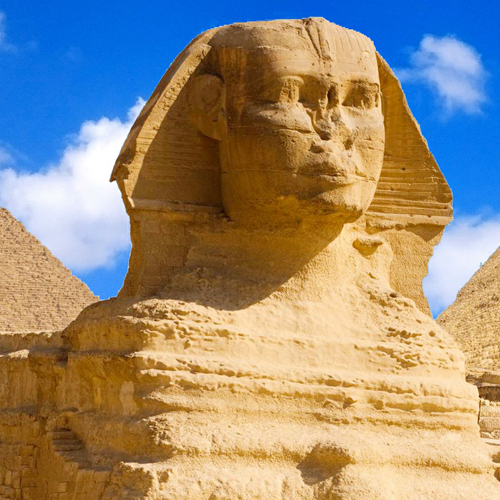No other nation in the world says ‘Welcome’ as often as the Egyptians, and every time, they mean it. While the ancient civilization of Egypt continues to amaze, contemporary Egyptians are equally remarkable.
History pyramids
The Giza Pyramids: Majestic Testaments of Ancient Egypt
Nestled on the outskirts of modern Cairo, the Pyramids of Giza stand as the most iconic and grandiose pyramid structures on Earth, embodying the zenith of ancient Egyptian architectural prowess. They were conceived during the Old Kingdom, the first golden age of Egyptian civilization, spanning from 2686 to 2181 BCE. This complex comprises three primary pyramids and the enigmatic Sphinx, forming a timeless tableau against the Egyptian horizon.
The Triad of Pharaonic Monuments
At Giza, each pyramid is a stone sentinel guarding the legacy of a Pharaoh. The Pyramid of Khufu, also known as the Great Pyramid, is an awe-inspiring structure, reaching a height of over 480 feet, making it the largest stone monument globally. Constructed under the aegis of Pharaoh Khufu, the second ruler of the fourth dynasty, it is a marvel of ancient engineering.
Adjacent to Khufu’s pyramid stands the second-largest pyramid, built to honor his son, Pharaoh Khafra. The Sphinx, an emblem of mystique and grandeur, believed to bear Khafra’s visage, resides beside his pyramid, further immortalizing his reign. The third pyramid, though smaller, signifies the enduring legacy of Menkaure, another fourth dynasty Pharaoh. Each pyramid is the core of a vast complex, encompassing smaller tombs, chambers, and cemeteries for nobility and high-ranking officials.
A Symbol of Divine Power and Afterlife Beliefs
Pyramids in ancient Egypt were not mere mortuary monuments but symbols of the Pharaohs’ divine authority and their journey into the afterlife. The death of a Pharaoh marked his transition from a semi-divine ruler on Earth to a celestial being among the gods. These pyramids, alongside their accompanying tombs, were repositories for the mummified remains of the Pharaohs, their treasured possessions, and sometimes their mummified servants and pets, destined for the afterlife.
Reflecting a Sophisticated and Hierarchical Society
The monumental scale of the Giza pyramids is a testament to the organizational, economic, and social prowess of ancient Egypt. Tens of thousands of workers, engaged in a highly hierarchical society, labored for years to erect these structures. The pyramids’ construction required meticulous planning and sophisticated knowledge in mathematics and engineering. The precisely aligned bases and perfectly proportioned triangular sides of the pyramids underscore this advanced understanding.
The Evolution of Egyptian Pyramids
The Giza pyramids’ architectural lineage traces back to mastabas, the earliest form of royal tombs, characterized by their flat tops and sloping sides. The step pyramid of Pharaoh Djoser, predating Giza by about a century, marked the evolutionary bridge between mastabas and the smooth-sided pyramids of Giza.
While the Giza pyramids are neither the first nor the last of their kind in Egypt, they remain unparalleled in their magnitude and grandeur. No subsequent Egyptian pyramids or monuments have rivaled their sheer size and stature, despite the continuation of the pyramid-building tradition for millennia.
Conclusion: A Legacy Carved in Stone
The Giza Pyramids, erected by three distinct Pharaohs of the Old Kingdom, are more than just monumental tombs; they are emblems of divine kingship, showcasing the might and spiritual beliefs of their creators. Beyond their religious and cultural significance, these structures are a testament to the prosperity, advanced social organization, and engineering capabilities of ancient Egypt. The Pyramids of Giza, while not the earliest, are indeed the most magnificent and enduring of all Egyptian pyramids, eternally etching the legacy of their Pharaonic patrons in the annals of history.
Created On March 18, 2020
Updated On Aug , 2024
GIZA Travel Guide



